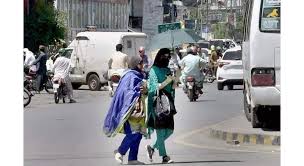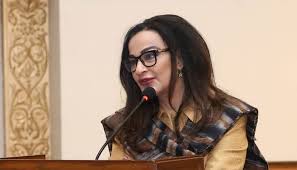Sherry calls for urgent climate action at “Road to Climate Resilient Pakistan” conference

Liaquat Ali
Islamabad: Senator Sherry Rehman on Thursday emphasized the need for immediate and genuine action to address climate change.
She was speaking as the chief guest at the “Road to Climate Resilient Pakistan: Reducing Our Carbon Footprint” conference, hosted by Islamic Relief Pakistan and the National Disaster Risk Management Fund (NDRMF),

Sherry Rehman said, “Climate is one conversation that must connect from local to global because climate knows no barriers when it changes. It can impact people and communities anywhere in the world. We have just seen a cyclone hit Bangladesh, and floods in Brazil and Afghanistan. Pakistan, too, is in the middle of a debilitating, scorching heatwave.
She cited that Mohenjo Daro was recorded as the planet’s hottest place with 53 degrees centigrade, reminding the world that such temperatures don’t support human life.

Speaking about Pakistan’s transition to renewable energy, Sherry remarked, “Pakistan’s transition from fossil fuels is quite doable. We have a large amount of solar capacity and a huge amount of wind capacity, particularly all the way through the Sindh coastal areas. Part of the problem is our ageing grid, which cannot take on a great deal of renewables anymore because there’s no space and also the incentive structures that are in place for solarization.”
Senator Rehman also highlighted Pakistan’s vulnerability to climate impacts, stating, “Pakistan is home to the largest number of glaciers outside the North Pole, with approximately 7,000 glaciers, and they are melting rapidly. When glacial lake outburst floods occur, the first to be affected are the small and medium hydro plants, which are vital for the community.

“While we mitigate risk by educating communities on how to relocate during such outbursts, the infrastructure, including hydro plants, bridges, and roads, often sustains severe damage. This necessitates continuous efforts in reinvention, rehabilitation, rebuilding, and restoration, which are challenging to maintain”.
“Resilience is not a one-size-fits-all definition or challenge. Like adaptation, it needs to reflect the particular needs of the local community and the terrain it is addressing. There is a convergence between developing resilience and reducing your carbon footprint, but make no mistake—if Pakistan reduces its carbon footprint to zero, there will still be scorching global warming.
“The fossil fuel industry worldwide is well on its trajectory to 2.5 to 3 degrees centigrade. Our mitigation commitment is to reduce our fiscal dependence on imported dirty fuel, leveraging our resources to reduce local pollution and make our contribution to the global commitment to carbon footprint reduction. It’s very important for countries, companies, communities, and individuals to start looking at their carbon footprint,” she asserted.
Senator Rehman emphasized the financial challenges associated with climate action, stating, “Adaptation costs four times more than normal development spending, and as the World Bank’s assessment indicates, Pakistan needs $348 billion by 2030, with $196 billion dedicated to mitigation. These figures underline the immense financial challenge of adaptation and mitigation.”
Regarding public and private financing, she noted, “While there is often a call to unlock private financing as a solution, it’s essential to acknowledge that private financing alone may not suffice. Private financing typically seeks profits, and in disaster situations, investing in disaster zones may not always align with profit motives. Therefore, relying solely on private financing overlooks the need for robust public funding mechanisms. It’s imperative to ensure that public funds are accessible and efficiently utilized, especially in vulnerable countries like Pakistan. Additionally, there should be a concerted effort to streamline the process of accessing climate financing, reducing bureaucratic barriers, and ensuring that funds reach communities in a timely manner.”
“This is not a victim conversation. Seeking an entitlement is never a victim conversation, either from your own government, your community, or the global north,” she concluded.





